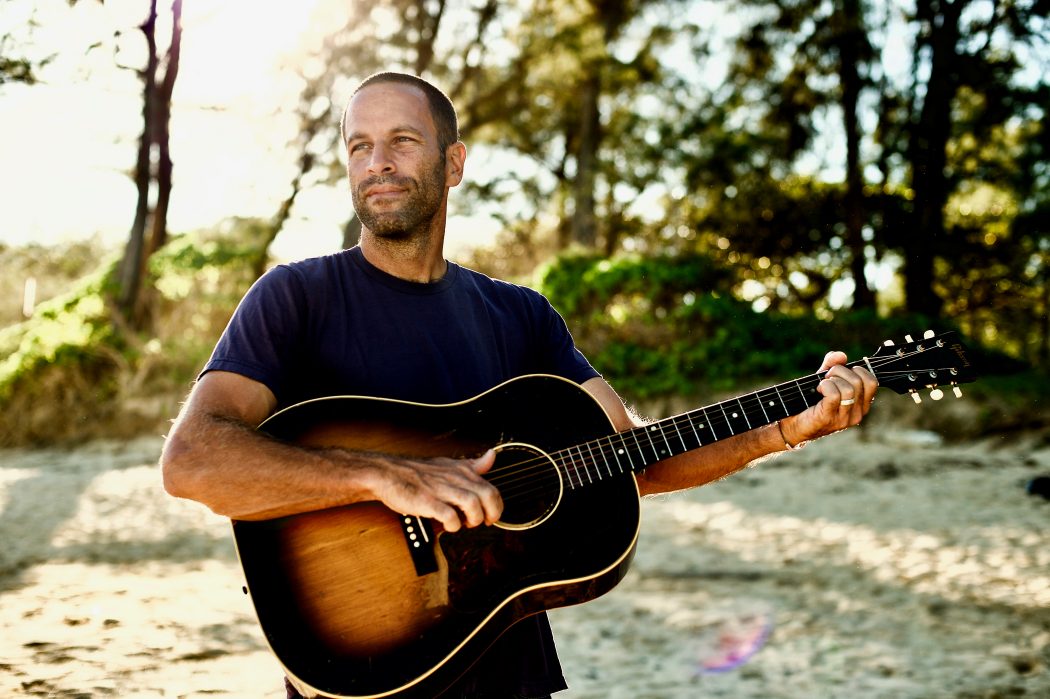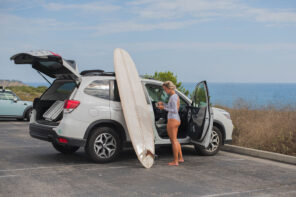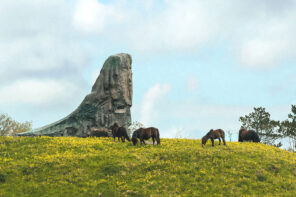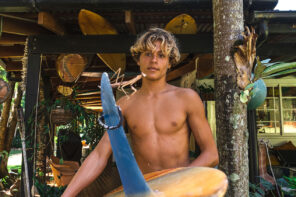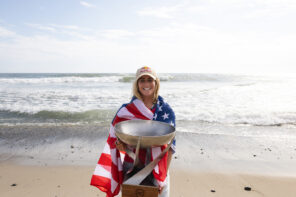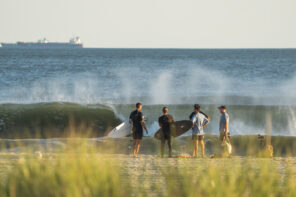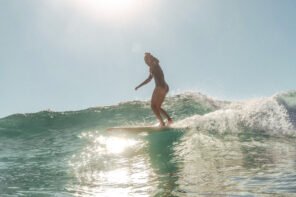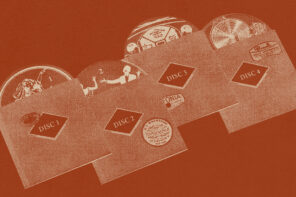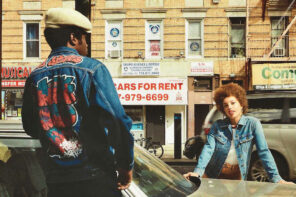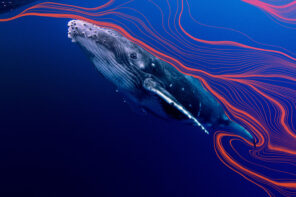Photos by Morgan Maassen
This is Jack. Jack likes music. Jack does not like plastics. The good news for most of us is that Jack is good at the things he likes and that has allowed him to approach ways to eliminate the things he does not like.
Simple enough equation it seems.
When recently doing the music thing he likes, Jack went and toured around the globe to bring his All At Once social action campaign to hundreds of thousands of fans. During this year on tour, The Johnson Ohana Foundation (HINT: That’s Jack’s foundation that he started with his wife, Kim) donated over $817,000 to 315 non-profit partners focusing on plastic-free initiatives, sustainable local food systems and environmental projects. An additional $1.1 million was raised by these non-profits through the All At Once donation matching program. All At Once also promoted 76 pre-show community events involving more than 5,400 volunteers, and over 100,000 environmental actions taken by fans in the Village Green.
Some Good Facts
On tour, Johnson’s team coordinates with venues, festivals and promoters to tackle plastic waste reduction from every angle and make the traveling show as sustainable as possible. They’ve eliminated more than 36,000 single-use plastic bottles were eliminated by providing All At Once Water Refill Stations. The crew partnered with REVERB to reduce the environmental footprint of the tour by working closely with venues to conserve energy, reduce waste and support carbon offset programs and supports more than 226 local farms through the Farm to Stage catering program. More than 9,600 gallons of recyclables and over 1,370 gallons of compostable food were collected at venues across the tour, diverting from local landfills and over 15 million pounds of carbon were offset with contributions from both venues and fans. Over 70,000 Steelys pint cups were sold or given to fans as part of a comprehensive Reusable Pint Program, eliminating the need for over 200,000 single-use plastic cups. Plastic straws were also eliminated thanks to the cooperation of venue partners, Live Nation and AEG.Like we said, simple enough.
Whalebone Magazine was fortunate enough to spend some time with Jack when he was in Hawaii just getting back from a surf at Haleiwa. The following interview should help on more of the good stuff and show ways to have less of the bad.
It would be nice to see popular culture kind of dreaming up more utopian futures instead of dystopian.
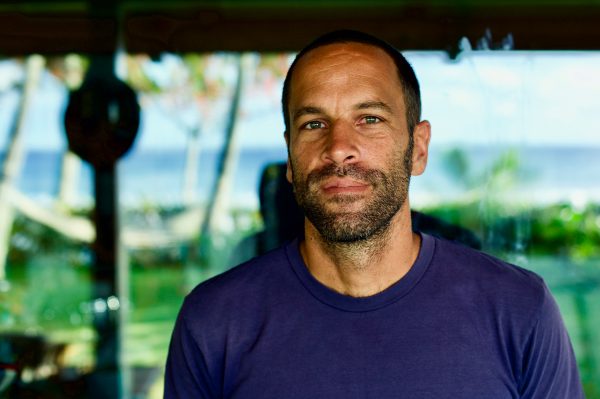
Whalebone Magazine: What is your preferred choice on the menu, talent or perseverance? And why?
Jack Johnson: I’d have to go for ordering the talent. I’ve got the other one already (perseverance) I think that’s how I got here with most things by keeping at it, so if I can get a little talent mixed in, I’ll be stoked.
WB: Biggest failure you feel like you’ve had in your life professionally.
Jack: The one that first popped in my mind, so it must be somewhat true is, I always wish I would have held onto the filmmaking career a little more. I was making surf films before the music thing even started. Then, when the music started it felt like one summer I was going to get to open for Ben Harper and then go back to making films. That’s what I had in mind at least, but I just kept rolling with the music thing.
I sometimes wish I would’ve kept the surf films alive a little more. I’m lucky and very fortunate that I still get to go on surf trips with friends now but I usually just bring boards and guitars instead of cameras. I look back on the films and sometimes think some of the best experiences in my life were making those couple of surf films—I got to shoot on a lot of Taylor Steele films and everything as well—but the ones that me, Chris Malloy and Emmett Malloy made together, September Sessions, and Thicker Than Water stick out. Maybe I should have taken a year off to surf and just have gone back and forth to music and film—would’ve been a cooler way to roll, maybe.
WB: Can you recall your first wave? Where you caught it, the location and how old you were?
Jack: I can remember a feeling. I’m not sure of my first wave exactly, but the first wave I can remember I think I was somewhere between Pupukea and Ehukai. It was a sandbar day, and my dad had me on the front of his longboard. I can remember, we took off on a wave. I can vaguely remember the waves before that, but I knew something was different about this one. I remember this one started to get steeper and steeper, and I was on the front of the board. Probably on my knees. I don’t even know if I stood up, but my dad had me up there with his arm on my shoulder. Then, we were riding along and it started to barrel over us. It was the first time I got that barrel vision. It probably took another 10 years before I saw it again on my own, but with my dad, he got us right in this barrel. Then it just exploded into a sandbar closeout and I can remember him reaching around underwater, grabbing me, and pulling me back to the surface. I was pretty freaked out, but at the same time, it was getting that tunnel vision that had me hooked after that. I must have been four or five or six—I can’t recall an exact age.
WB: The most human person you think you have ever met?
Jack: Immediately I think about my close friends that I keep up with. These are people who don’t deal with things that could start to pull you away from being human. They probably win, you know, just all my friends that I’m still friends with since I was a kid. I guess the ones that are more interesting are people who have been affected to a point where they might have been pulled away from being human a little, and that can definitely happen from all the attention you get, and then the strangeness with social media and everything.
But I’d say, Dave Rastovich is pretty human, I was just surfing with him. I’m always really impressed with David, whenever we hang out, and we hang out quite a bit. We’ll talk surfboard design sometimes, because that’s fun too, but we don’t talk too much about surfing. It’s usually about beekeeping or drumming or music. He doesn’t seem very preoccupied with the industry that he’s a part of. He just stays interested in everything around him at all times, and conversation. He’s a really good listener. He’s one that pops to mind.
And Willie Nelson too, as far as music goes, we just played his 85th birthday out in Nashville a couple days ago. That’s one guy where I’m always really impressed with how present he still is in a conversation with you and just what a sweet, kind person he is to everybody. He always wants everybody to do well. He’s the ultimate collaborator. He always has musicians come up and play with him. He kind of lets them have the spotlight. He just wants to host those when he’s playing. He’s got enough confidence in his songwriting that he’s happy just to host and have somebody playing along with him.
Those are two people that pop into my mind that are very human for their situations. It’s nice to be around people where you really feel like there’s no other place you’d rather be at that moment. There are certain people that have that quality to them.
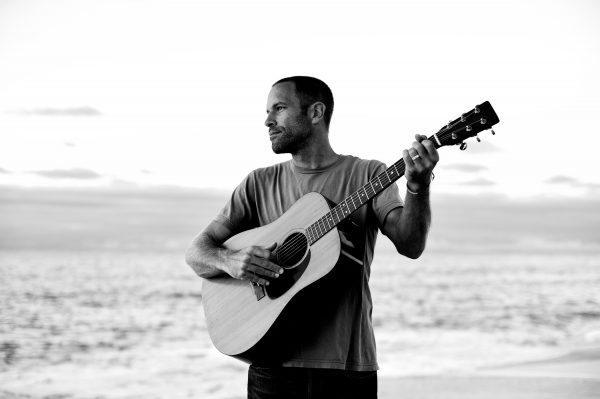
WB: Somewhere else in the Good Issue we ask a bunch of little kids to define love. Knowing you could likely beat them all at wrestling and ultimately become the leader of their gang, how would you define love? What would you tell them?
Jack: I would say unfortunately your new gang leader is a little off on this one. I’ve spent my whole career, I don’t want to say career, it sounds cheesy, but the whole time writing songs and all that stuff, and my friend, Zach Gill, that plays piano in my band, he’s a really great songwriter, one of my favorites, Zach and I talk often talk about that it’s pretty much just time and love, that’s all we really sing about in different ways. Sometimes it’s the love song because it’s talking about loss, that you’ve lost somebody you love. Other times you’re singing about a certain feeling that you love or trying to get a good vibe across. It’s like, I love surfing and I love my kids. But it’s two different kinds of love though, because it’s really nice in life when you love people. It takes away a little of your own self-importance. If you love somebody so much that you start thinking about them more than you, and I think that’s one healthy way to sort of move onto towards the third and fourth quarter of your life is to start to love things more than yourself. Then it’s your own health, you want to stay in good health, but as long as your kids are healthy that is kind of all that matters. It’s easier to watch your own self deteriorate when you love something more than yourself.
It’s waves like that, the ones where you have to commit underneath the ledge.
WB: What scares you?
Jack: Pipeline. It’s weird to say. I surf. I grew up in front of Pipeline from when I was about 12 years old. I used to live down on the beach a little bit in front of another spot. So you kind of surf where you live. Then at 12 I started paddling out. We just sit on the shoulder and watch. Then by 14 we were kind of shoulder hopping. At 15, 16, we were actually trying to get waves in the lineup. Then by the time we were 17, 18, me and a lot of my good friends were trying to get sets on Pipeline and kind of just taking off on any wave that we could. I look back now, having my own kids, and it’s waves like that, the ones where you have to commit underneath the ledge, and there’s a lot of peer pressure out there. There’s a lot of focus on this one spot where you can take off and if you’re in that spot, and the wave comes, you have to go. At that time in my life I didn’t see it as scary, it was just exciting. Now, as a parent, that kind of scares me because I have my own kids that are surfing.
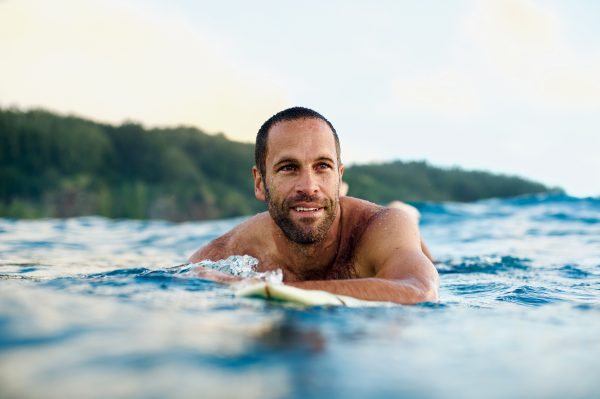
WB: A town, a book, and a movie that you think everyone should experience before they kick the bucket?
Jack: Town. Paris is pretty fun. There’s something about being there that I always kind of dig, just the history of all the different creative people that were drawn to it at different times. It’s really exciting to walk around there. It has nothing to do with my normal life, so it’s so fun just to be a stranger in Paris.
Book. I’m going to go with Sirens of Titan by Kurt Vonnegut. It’s a book I like a lot because of just the perspective of it. I love it. Here is a glimpse, a guy creates a religion on earth and he unites all of humanity. He’s so proud of himself. By the end of the book he ends up on this moon next to an alien, who’s kind of like, “Wow, that’s so cute. It’s neat that you united all the humans, but all they’re just there for—and all that earth is there for—is to send me signals about this part that I’m waiting for my spaceship, you know, and it’s like every million years is like five minutes for me.” When everything seems so heavy and sometimes overwhelming, to sometimes just zoom out and realize we’re a little speck out here floating. Kurt Vonnegut does that.
Movie. I’d say Big Lebowski I like a lot, but it’s kind of a weird one. I don’t know if everybody needs that experience. You think everybody needs the experience, but then you show your 12-year-old kid, and then you realize every other word is fuck. So maybe not that but Fistful of Dollars and then Yojimbo, back-to-back is great.
WB: If you could exchange all your talents and successes to be as talented and successful in another field or category of life what would that be?
Jack: I think navigator. I like to sail a little. My dad had an interesting life where he did a lot of journeys on different ships and sailboats between islands and across oceans. That was something I always kind of, in my heart, wanted to do more of. I feel like I missed my chance.
WB: When putting this piece together we learned about how you approach touring and what you bring to an event, what you leave behind, and how that plays into the values of you and your touring mates. Where did that come from?
Being somebody who loves the ocean, there’s a lot of different ways you can support the health of the sea. For one thing, when we tour, we try to make those connections between the waste that our industry is making and how it can be better for people, especially young people, who are coming to the shows and what they can do to help their local community. So trying to eliminate the single-use plastic at the shows, it’s just real obvious for me growing up in Hawaii, where you don’t see many postcards of the eastern shores of the islands, or if you do they’re pulled back a little bit, but along the beach where it’s just like literally certain coves and certain places along the east shore, it’s the makeup of the sand now is plastic as part of the sand, there are little microplastics that are part of the sand, it’s that colorful sand. And I’ve watched that over my lifetime get worse and worse. And some of the beaches, the whole high tide line is just covered with plastic now.
If you walk back out on the stage after the show’s over you can see a sea of plastic out in the bleachers and on the floor.
So to see all that and then to be part of an industry where every night if you walk back out on the stage after the show’s over you can see a sea of plastic out in the bleachers and on the floor and at the festivals and whatnot—there’s so much plastic in any kind of entertainment industry. So for me, that was us wanting to call on ourselves and acknowledge that we are part of an industry that has a really bad plastic problem and try to find some solutions. We’ve been trying to have plastic-free shows where we find ways where people can bring their own reusable cups in, or we’ve had ones where we distributed them for free. We’ve been testing to get a sense of what kind of problems there would be if everybody at the venue had one.
We did that at Santa Barbara Bowl. It was part of the ticket, you got a cup we provided on the way in, and we just wanted to see if people would complain, because a lot of times you hear people say, “Oh people just want their convenience of not having to go back to refill and be able to just take the bottle …” and it was cool, because our friends at the Santa Barbara Bowl were up for trying it, and then afterwards we asked them, “Did you guys get many complaints?” And they said, “Not a single one. If anything, it was one of the rare shows where we got people calling in or emailing us to say thanks for doing it. We got more people giving us props for trying it, and we didn’t get anybody complaining.” So it’s worth trying things like that just to see what the hurdles are. It’s cool when you cannot just leave an environmental footprint, but leave a positive footprint. It’s something good happening in that town after you leave—those are some of the things we try to do.
Personally, I’m interested in all kinds of environmental issues, but we try to find the ones that are sort of specific to what we are doing, and that’s how we ended up on plastic elimination. But it has been one I’ve become more interested in.
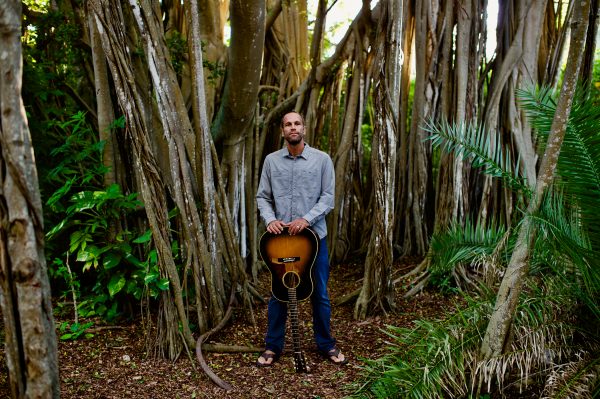
WB: One thing you would like to see in your lifetime?
Jack: It would be nice to see a world where people in popular culture felt like things were getting better. There’s a lot of things to be positive about and to find out in the world that you can feel positive about. But it just feels so much like, Hollywood films, the media and everything, there is such a dystopian view of the future. It would be great to get to a place where people felt the world was getting better in general. But I just think for people to dream of a better future, it would be nice to see popular culture kind of dreaming up more utopian futures instead of dystopian.
WB: Favorite thing about Mexico.
Jack: When I played music there a couple of times there’s not really a line between the stage and the crowd. Everybody’s sort of participating. The amount of energy where people are singing and clapping and sort of bringing tambourines to the shows and joining in. There’s a really nice musical culture there.
WB: Is there a photo you have taken or a photo that someone else has taken that you would be okay if it hung in your house and you had to see it every day. And why?
Jack: Yeah, I have it, because it’s my favorite photo, it just came into my world a couple of days ago actually. And the cool thing is is I’m going to give her props, because if it was anyone other than my friend, I wouldn’t even say their name, but she’s actually a photographer. So I think part of the reason she got such an amazing shot, it was just a bunch of friends out surfing the other day, we had this real amazing summer-like day in the middle of the winter about a week ago, and everybody was kind of freaking out because all of a sudden all the kids could surf and everything, it was really fun. And my friend, her name is Tinea Roy, and she’s a really good photographer. And she grabbed this picture of my nine-year-old daughter and my nephew who’s in his 20s, surfing on this wave, and it’s the image that I want to look at forever. They’re both smiling so big and they both have that perfect glide going. And then there’s the quality of the photo—it has this really nice depth of field, in the foreground it’s kind of out of focus, and then it’s so focused on their beaming smiles and then gliding. So that’d be the one. I want to get that one blown up. It’s the best picture I’ve ever seen.
WB: Nice. Thanks, man. Greatly appreciate the time. Hope to see you down the line.
Jack: Same. Thank you for this.

